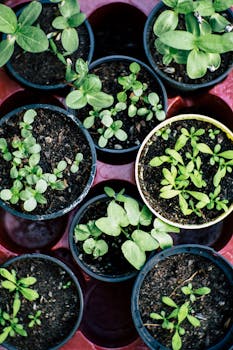Gardening for Wellness: The Mental and Physical Benefits of Gardening

Gardening is more than just a hobby or a way to beautify your surroundings; it's a powerful activity that offers numerous mental and physical health benefits. Whether you’re tending to a vegetable patch, growing herbs, or nurturing a flower garden, the act of gardening connects you with nature, encourages physical activity, and provides a sense of accomplishment. Let’s explore how gardening can contribute to your overall wellness and why it’s a therapeutic practice for people of all ages.
1. Reduces Stress and Anxiety
Gardening is a natural stress reliever that allows you to disconnect from the demands of daily life. The rhythmic actions of planting, weeding, watering, and harvesting help you enter a state of mindfulness, reducing stress and anxiety levels.
Benefits:
Exposure to nature lowers cortisol (the stress hormone) levels, promoting relaxation.
The repetitive motions of gardening have a calming effect, similar to meditation.
Spending time outdoors in green spaces helps to clear the mind and enhance mental clarity.
Tip: Spend at least 30 minutes in your garden daily, focusing on the sights, sounds, and smells to boost relaxation and mindfulness.
2. Boosts Mood and Mental Health
Gardening has been shown to improve mood and mental well-being, offering a natural way to combat feelings of depression and sadness.
Benefits:
Exposure to sunlight increases the production of serotonin, the "feel-good" hormone that elevates mood.
Physical activity in gardening releases endorphins, which help reduce symptoms of anxiety and depression.
The sense of achievement from nurturing plants and seeing them grow fosters a positive mindset and boosts self-esteem.
Tip: Start with easy-to-grow plants like herbs, lettuce, or marigolds to experience quick success and a sense of accomplishment.
3. Provides Physical Exercise
Gardening involves a range of physical activities, such as digging, planting, weeding, pruning, and lifting, which can improve your strength, flexibility, and overall fitness.
Benefits:
Engages various muscle groups, promoting strength, endurance, and flexibility.
Activities like digging and raking provide a cardiovascular workout, enhancing heart health.
Gardening burns calories, making it an effective form of moderate exercise that can aid in weight management.
Tip: Incorporate stretching and bending while gardening to improve flexibility and reduce the risk of injury.
4. Encourages Healthy Eating Habits
Growing your own fruits, vegetables, and herbs encourages healthier eating habits and a deeper appreciation for fresh, nutritious food.
Benefits:
Having access to homegrown produce promotes the consumption of more fruits and vegetables, improving overall nutrition.
Gardening teaches you about the origins of your food, leading to more mindful eating.
Freshly harvested produce retains more vitamins and minerals than store-bought alternatives.
Tip: Start a small vegetable garden with easy-to-grow options like tomatoes, lettuce, bell peppers, and herbs to incorporate fresh produce into your diet.
5. Enhances Cognitive Function and Mental Clarity
Gardening stimulates cognitive function by engaging the brain in activities that require planning, problem-solving, and creativity.
Benefits:
Helps improve focus, concentration, and memory, especially in older adults.
Engaging in gardening activities can reduce the risk of cognitive decline and dementia.
Learning about different plants, gardening techniques, and soil types stimulates mental growth and keeps the brain active.
Tip: Challenge your brain by experimenting with new gardening methods, such as vertical gardening, hydroponics, or companion planting.
6. Promotes Connection with Nature and Grounding
Gardening offers a way to reconnect with nature, promoting feelings of tranquility and balance. This connection can help reduce the negative effects of urban living and technology overload.
Benefits:
Being outdoors exposes you to fresh air and natural light, which can boost energy levels and improve mood.
The practice of grounding (connecting with the earth by touching soil or plants) can reduce inflammation, improve sleep, and enhance overall well-being.
Observing the natural cycles of growth, decay, and renewal in a garden fosters a sense of harmony and appreciation for the environment.
Tip: Take off your shoes and feel the soil beneath your feet or work with your hands in the soil to enhance your connection with nature.
7. Encourages Social Interaction and Community Building
Gardening can be a social activity that brings people together, whether you’re gardening with family, neighbors, or participating in a community garden.
Benefits:
Sharing gardening experiences, tips, and produce fosters a sense of community and connection.
Working in a community garden helps reduce feelings of isolation and loneliness, particularly among seniors and people living alone.
Collaborative gardening projects can strengthen relationships and create opportunities for learning and skill-sharing.
Tip: Join a local gardening club or participate in a community garden to meet new people, learn from others, and build friendships.
8. Provides a Sense of Purpose and Achievement
Gardening gives you a sense of purpose, as you’re actively nurturing and caring for living things. The satisfaction of watching your plants grow and thrive offers a rewarding experience that boosts self-confidence.
Benefits:
The act of planting seeds, nurturing them, and witnessing their growth can provide a sense of accomplishment and joy.
Gardening offers a sense of responsibility and purpose, which can be especially beneficial for individuals dealing with mental health challenges.
Completing gardening tasks provides a tangible sense of achievement, enhancing self-esteem and motivation.
Tip: Set small gardening goals, such as growing a new type of plant or creating a garden bed, to experience a sense of progress and accomplishment.
9. Improves Immune System Function
Spending time outdoors and getting your hands in the soil can boost your immune system by exposing you to beneficial bacteria and microbes.
Benefits:
Soil contains friendly bacteria, such as Mycobacterium vaccae, which can stimulate the immune system and improve mood.
Exposure to sunlight helps your body produce vitamin D, which is essential for a healthy immune system.
Tip: Don’t be afraid to get a little dirty! Gardening without gloves occasionally allows your body to interact with beneficial microbes in the soil.
10. Encourages Sustainability and Environmental Awareness
Gardening promotes sustainable living by encouraging you to grow your own food, conserve water, and support biodiversity.
Benefits:
Growing your own produce reduces your reliance on store-bought, packaged goods, decreasing your carbon footprint.
Composting garden waste helps recycle nutrients, enrich the soil, and reduce waste in landfills.
Gardening with native plants supports local wildlife, such as bees, butterflies, and birds.
Tip: Practice sustainable gardening by using compost, rainwater, and organic pest control methods to reduce your impact on the environment.
Getting Started with Gardening for Wellness
Begin Small: Start with a few pots of herbs or a small garden bed to gradually develop your gardening skills.
Choose the Right Plants: Select plants that suit your climate, soil type, and gardening experience level.
Create a Gardening Routine: Dedicate a specific time each day or week to tend to your garden, ensuring consistency and progress.
Enjoy the Process: Embrace gardening as a journey, not just a task, and take pleasure in watching your garden grow.
Gardening is a powerful activity that nurtures both the body and mind, offering countless physical and mental health benefits. Whether you have a spacious backyard, a balcony, or a few pots on a windowsill, gardening provides an opportunity to connect with nature, reduce stress, stay active, and enjoy a sense of accomplishment. By incorporating gardening into your wellness routine, you can cultivate a healthier, happier lifestyle while reaping the rewards of nature’s bounty. So, grab your gardening gloves, get your hands dirty, and start growing your path to wellness!

